Source of article Litigation Insights.
We recently conducted a focus group, along with a nationwide survey of over 150 respondents, that shed light on how the internet – and particularly social media – has influenced juror’s attitudes, experiences, and expectations toward customer service. What we learned suggests that their changing attitudes are likely to have a notable effect on consumer-facing company defendants.
Let’s look at some of our key results:
1) Social Media Is a Growing Method to Contact Customer Service and Interact with Companies
More and more, jurors are using the internet and social media for customer service and to interact with companies. While the primary way jurors prefer to interact with customer service is still via phone (65%), a significant percentage prefer online interaction, including social media (32%). Representing a third of any given company’s customer base, companies can’t afford to ignore this trend. Furthermore, 55% of jurors have used social media to compliment a product or service and 33% have used it to complain.
Not especially surprising – it’s 2019, after all. But what’s interesting is that this trend extends across all age groups; it’s not just a “millennials” thing. A significant portion of people across all ages prefers to contact customer service through the internet/social media. And in fact, the 40-49 age range had the highest percentage, by a decent margin!
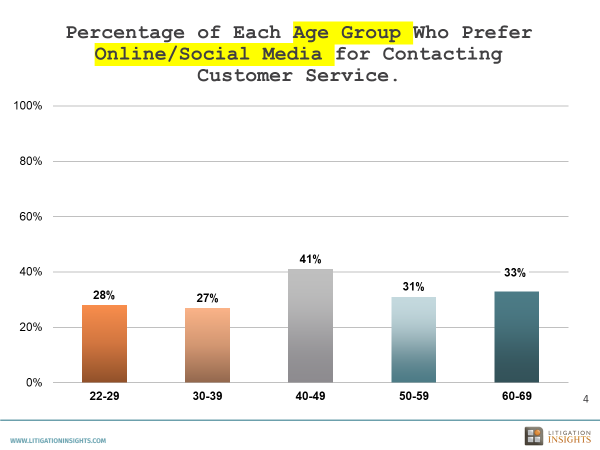
2) Companies Must Respond Promptly to Complaints
Social media as a customer service medium has some important differences from other points of contact.
First, it is no longer a dialog between one customer and a company. The complaints are broadcast to a larger audience, who can weigh in on these complaints and begin making their own judgements. Consumers have a voice and a platform from which they can exert control over their – and to some extent, others’ – relationship with a company. Where previously there were few options for customers who had negative interactions, social media now gives them a level of catharsis and control that writing a letter to the company or the editor of the local paper just didn’t have.
Second, the internet and social media bring the expectation of a much faster response. As we learned, 60% of jurors expected a response within 24 hours of contacting customer service. Another 15% expected a response within a single hour!
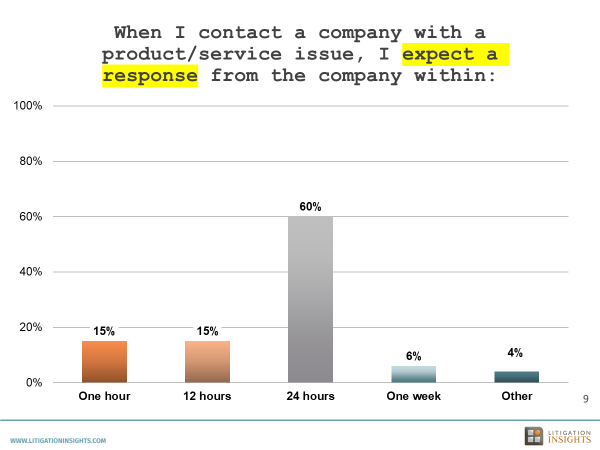
The power and speed granted by the internet and social media are a likely reason that jurors expect better customer service overall: 57% of those we surveyed indicated that their expectations for customer service have increased over the last three years.
3) Companies Must Act Promptly and Proactively
Responding quickly isn’t enough; jurors also expect a company to act after learning about a problem. If jurors can receive near instantaneous responses from companies over social media, it’s possible this is driving their expectations for how quickly they expect problems to get resolved. In the era of instant communication, people just have less patience for a drawn-out resolution. As 66% responded, the #1 hallmark of good customer service is resolving a problem quickly.
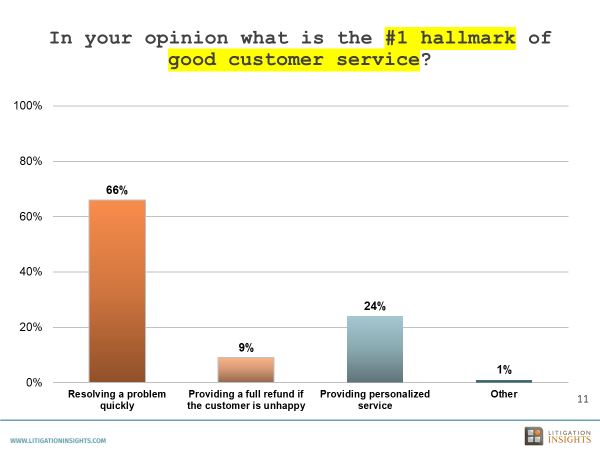
Furthermore, jurors believe they shouldn’t have to experience a problem first-hand to be informed of potential issues or for a company to take proactive measures.
For one, they expect corporations to communicate clearly about any potential problems with their products and any risks associated with them. Ninety-two percent of our respondents expected to be notified of problems with products they’ve purchased, no matter how small, and 86% percent thought corporations had a duty to warn of every possible risk associated with a product.
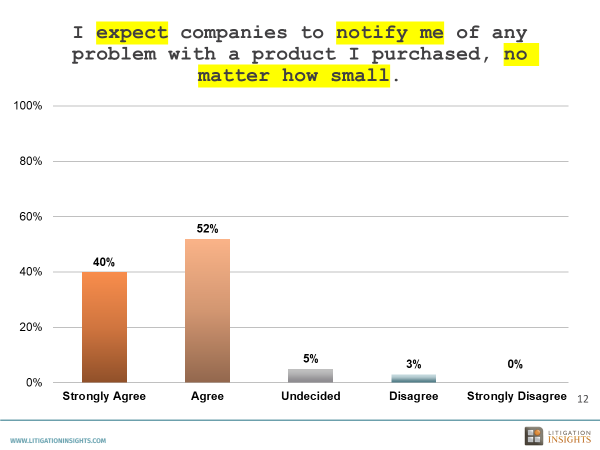
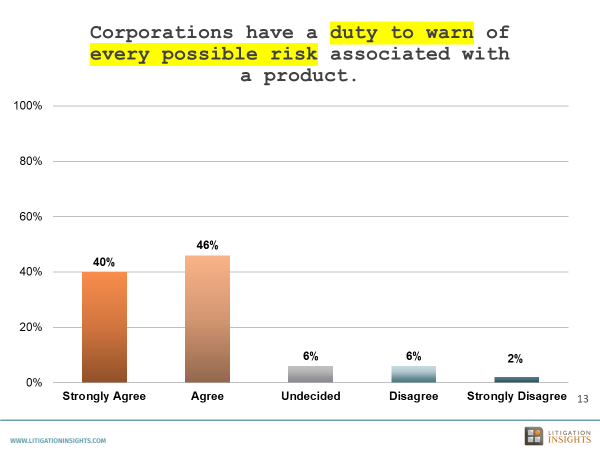
And as they see it, serious cases warrant serious reactions. For instance, if there is any chance a product could be dangerous, 86% of jurors expected the manufacturer to recall the product.
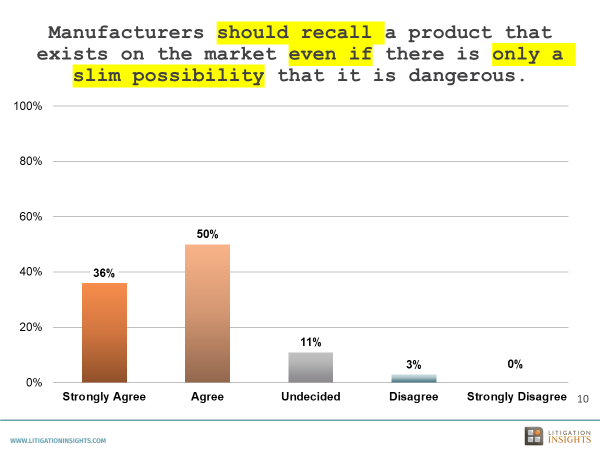
4) Customer Service Is the Foremost Indication of How a Company Values Its Customers
Ultimately, understanding jurors’ high expectations is crucial because, according to our results, 96% of jurors agreed or strongly agreed that good customer service is the true test of how much a company values a customer.
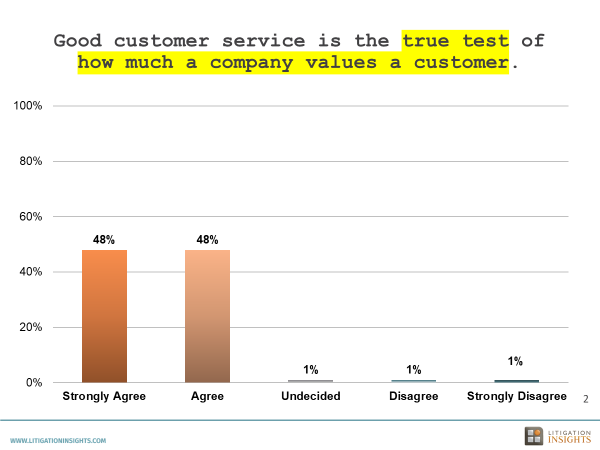
Now, if you meet their expectations, you’re fine. It’s when you fail to meet those lofty expectations that you run the risk of jurors making negative attributions about your company and behavior. Indeed, jurors are very willing to cut ties with companies due to poor customer service. According to our poll, 74% of jurors said they had moved away from or stopped doing business with a company because it failed to provide good customer service.
What Does This Mean for Company Defendants?
So, we see that consumers are willing to ditch a company over poor customer service, and all the while their expectations of what constitutes satisfactory customer service are increasing. The implications of this finding in the marketplace are one thing – but what about when real jurors are examining the customer service actions of a company defendant?
The short answer is that jurors are more willing to judge and criticize a company for how it handles its problems (i.e., its customer service). They expect a prompt notification, a prompt fix, and thorough communication of potential risks, problems, or defects, “no matter how small.” This can translate into a steep uphill battle for company defendants, who must provide a convincing rationale for any such delays, “failures” to warn or inform, or decisions not to recall a product (or to do so swiftly) – else they risk adversely impacting their “good company” defense.
We’ve recently seen this in action: A defendant company came to us upon receiving some particularly harsh verdicts in a class-action lawsuit, so we ran a focus group to try to determine why jurors may have been so keen to penalize it. What we found is that our mock jurors were holding the defendant to extremely high standards to fix the alleged defect in question – standards derived from their customer service attitudes and expectations. The company didn’t meet those sky-high standards, and as a result, jurors’ decisions demonstrated a disbelief of the company’s defenses. Indeed, many viewed the company’s response to the “problem” as deserving of punitives.
This company failed to win over the jurors’ hearts and minds because it had appeared to devalue its customers in its response to the issue. Luckily, by identifying why jurors were receiving these impressions, we were able to help our client restructure their narrative for future trials.
Final Thoughts
The public’s changing attitudes toward customer service are not only in the marketplace but also bleeding into the courtroom. Corporations with products and/or services need to consider how their actions when handling problems are going to be evaluated by jurors. How quickly they respond, how quickly they take action, how successful those actions are, and to what extent they inform the public about potential issues may be viewed by jurors down the road – where they will have to defend their behavior against some very high standards.


By: Merrie Jo Pitera, Ph.D. – CEO and Katrina Cook, Ph.D. – Consultant
The post How Do Jurors’ Customer Service Expectations Affect Company Defendants? appeared first on Litigation Insights.
